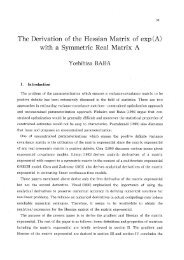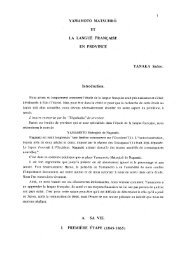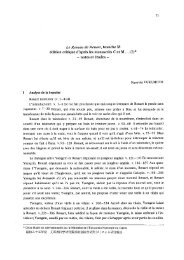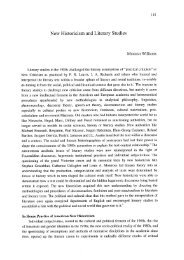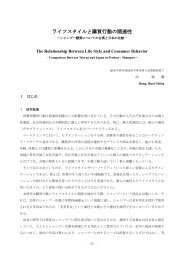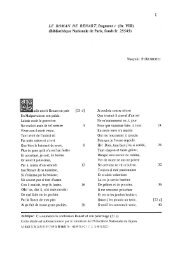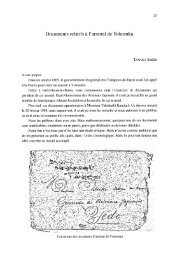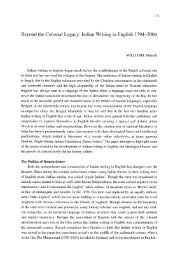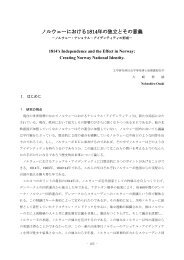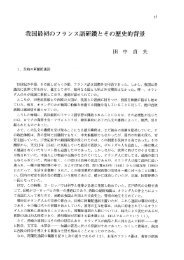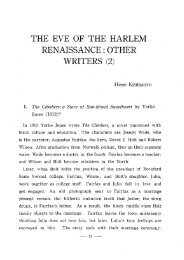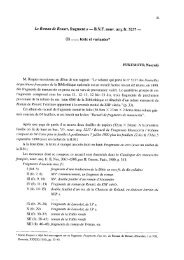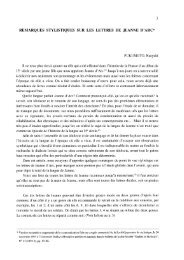vision and methodology in the new economics of global ...
vision and methodology in the new economics of global ...
vision and methodology in the new economics of global ...
Create successful ePaper yourself
Turn your PDF publications into a flip-book with our unique Google optimized e-Paper software.
March 1982 Vision <strong>and</strong> Methodology <strong>in</strong> <strong>the</strong> New Economics 61<br />
As is well known, <strong>the</strong> traditional systematizations <strong>of</strong> <strong>economics</strong> have tended to follow<br />
paths <strong>of</strong> becom<strong>in</strong>g ever more specialized <strong>and</strong> ever more broken down <strong>in</strong>to narrow com-<br />
partments. If we take a look at university courses, for example, we see that students<br />
choose from a menu <strong>of</strong> extremely diversified <strong>economics</strong> courses, under such names as<br />
Macroeconomic Theory, Microeconomic Theory, History <strong>of</strong> Economic Theory, Economic<br />
Policy, Public F<strong>in</strong>ance, Monetary Theory, <strong>and</strong> International Economics, etc.<br />
Indeed, <strong>the</strong> field <strong>of</strong> "<strong>economics</strong>" has become specialized <strong>and</strong> compartmentalized even<br />
to <strong>the</strong> po<strong>in</strong>t where we may <strong>in</strong> some cases have what could be called <strong>the</strong> "specialized<br />
ignoramus." Nowadays <strong>the</strong> "economist" may possibly have <strong>the</strong>ir credentials as a<br />
scholar called <strong>in</strong>to question if <strong>the</strong>y do not cont<strong>in</strong>ually digest <strong>the</strong> bulg<strong>in</strong>g number <strong>of</strong><br />
domestic <strong>and</strong> foreign reference works just <strong>in</strong> <strong>the</strong>ir own narrow compartmental doma<strong>in</strong>.<br />
As a result, <strong>the</strong>y necessarily have great deal <strong>of</strong> time taken away <strong>in</strong> <strong>the</strong> pursuit <strong>of</strong><br />
"reference materials<br />
," <strong>and</strong> <strong>of</strong>ten never gets around to o<strong>the</strong>r important matters <strong>in</strong><br />
doma<strong>in</strong>s which may not be strictly "economic" accord<strong>in</strong>g to traditional notions. Con-<br />
sequently, <strong>the</strong>y may spend a whole lifetime cl<strong>in</strong>g<strong>in</strong>g with a one-track m<strong>in</strong>d to <strong>the</strong>ir<br />
own narrowly specialized field <strong>and</strong> never form<strong>in</strong>g a wider <strong>vision</strong>.<br />
This situation tends to make <strong>the</strong> <strong>vision</strong> <strong>of</strong> many economists dist<strong>in</strong>ctly monocular.<br />
The fact is that many economists take only "economic" problems <strong>in</strong> <strong>the</strong> narrow sense<br />
as hav<strong>in</strong>g importance <strong>and</strong> discard from consideration related fields <strong>of</strong> knowledge <strong>and</strong><br />
<strong>in</strong>quiry, with <strong>the</strong> result that <strong>the</strong>ir <strong>the</strong>oretical models tend to be extremely oversimplified.<br />
This is precisely <strong>the</strong> great dilemma which contemporary economists face. To overcome<br />
this dilemma, Gunnar Myrdal suggests <strong>the</strong> utility <strong>of</strong> <strong>in</strong>terdiscipl<strong>in</strong>ary research.2> He<br />
argues that specialized knowledge is com<strong>in</strong>g to be required even <strong>in</strong> fields which were<br />
earlier discarded from purview <strong>in</strong> <strong>the</strong> traditional "<strong>economics</strong>", <strong>and</strong> that <strong>the</strong>re is an<br />
<strong>in</strong>creas<strong>in</strong>g need to organize research that mobilizes <strong>the</strong> knowledge <strong>and</strong> judgemental<br />
capabilities <strong>of</strong> specialists <strong>in</strong> various fields.<br />
This signifies <strong>the</strong> end <strong>of</strong> an era <strong>in</strong> which economists could properly restrict <strong>the</strong>ir<br />
research only to "<strong>economics</strong>." Today it is required for economists that <strong>the</strong>y have not<br />
only an adequate ground<strong>in</strong>g <strong>in</strong> <strong>economics</strong> but also an <strong>in</strong>tellectual breadth <strong>and</strong> basic<br />
knowledge which allows an underst<strong>and</strong><strong>in</strong>g <strong>of</strong> specialized knowledge about a wide range<br />
<strong>of</strong> matters <strong>in</strong>clud<strong>in</strong>g resources, population, environment, energy, education <strong>and</strong> welfare..<br />
Today it is this sort <strong>of</strong> economic "<strong>vision</strong>" which is so very much needed.<br />
The real world does not fit <strong>in</strong>to <strong>the</strong> scholastic subdi<strong>vision</strong>s <strong>and</strong> compartments <strong>of</strong> one<br />
2) Gunnar Myrdal, Aga<strong>in</strong>st <strong>the</strong> Stream: Critical Essays on Economics, R<strong>and</strong>om House, New York,<br />
1942.



